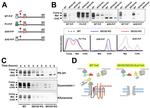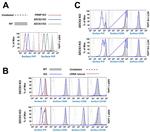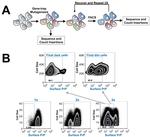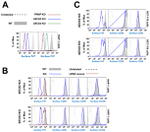Search Thermo Fisher Scientific
Invitrogen
CD230 (PrP) Monoclonal Antibody (4D5), eBioscience™
This Antibody was verified by Knockout to ensure that the antibody binds to the antigen stated.
FIGURE: 1 / 5
CD230 (PrP) Antibody (14-9230-82) in Flow
-Flow-20170216130641.jpg?time=20240507)




Product Details
14-9230-82
Species Reactivity
Published species
Host/Isotype
Class
Type
Clone
Conjugate
Form
Concentration
Purification
Storage buffer
Contains
Storage conditions
Shipping conditions
RRID
Product Specific Information
Description: CD230 (prion protein; PrP^C) is a 35 kD glycoprotein, attached to the cell surface via a GPI-anchor. While the function of CD230 is unclear, prion protein has been the focus of research based on its involvement in transmissible spongiform encephalopathies (TSE), including Creutzfeld-Jakob disease in humans. CD230 undergoes a conformational change in which the cellular PrP^C form is converted to the scrapie PrP^Sc form. This conversion is essential for the infectiousness of prion-based diseases. CD230 is predominantly expressed on the surface of lymphocytes and monocytes, with weak expression on granulocytes and erythrocytes. In platelets, CD230 is expressed primarily intracellularly, and is upregulated to the surface upon activation.
Applications Reported: This 4D5 antibody has been reported for use in flow cytometric analysis and immunoprecipitation. The 4D5 antibody has also been found useful for immunoblotting, recognizing a protein of approximately 35 kD under non-reducing conditions.
Applications Tested: The 4D5 antibody has been tested by flow cytometric analysis of normal human peripheral blood cells. This can be used at less than or equal to 0.5 µg per test. A test is defined as the amount (µg) of antibody that will stain a cell sample in a final volume of 100 µL. Cell number should be determined empirically but can range from 10^5 to 10^8 cells/test. It is recommended that the antibody be carefully titrated for optimal performance in the assay of interest.
Purity: Greater than 90%, as determined by SDS-PAGE.
Aggregation: Less than 10%, as determined by HPLC.
Filtration: 0.2 µm post-manufacturing filtered.
Target Information
Human prion protein (PrP), also known as PRNP, is a ubiquitously expressed GPI-anchored cell surface glycoprotein associating with lipid raft components and functioning as a signaling molecule. PrP plays a role in apoptosis in a cell context-dependent manner, is involved in proliferation of epithelial cells and in distribution of junction-associated proteins in human enterocytes. Conversion of this normal cellular prion protein (PrPc) into an abnormal conformer (PrPSc) is the crucial step associated with triggering the pathogenesis of the prion neurodegenerative disorders, such as the Creutzfeld-Jakob disease (CJD). Whereas PrPc is rich in alpha-helices, the PrPSc form has higher content of beta-sheets and is resistant to proteinase K.
For Research Use Only. Not for use in diagnostic procedures. Not for resale without express authorization.
Bioinformatics
Protein Aliases: Alternative prion protein; AltPrP; ASCR; BSE; CD230; CD230 antigen; Major prion protein; MGC26679; prion-related protein; PrP; PrP27-30; PrP33-35C; TSE
Gene Aliases: ALTPRP; ASCR; CD230; CJD; GSS; KURU; p27-30; PRIP; PRNP; PRP; PrP27-30; PrP33-35C; PrPc
UniProt ID: (Human) F7VJQ1
Entrez Gene ID: (Human) 5621

Performance Guarantee
If an Invitrogen™ antibody doesn't perform as described on our website or datasheet,we'll replace the product at no cost to you, or provide you with a credit for a future purchase.*
Learn more
We're here to help
Get expert recommendations for common problems or connect directly with an on staff expert for technical assistance related to applications, equipment and general product use.
Contact tech support
-Flow-20170216130641.jpg?time=20240507)